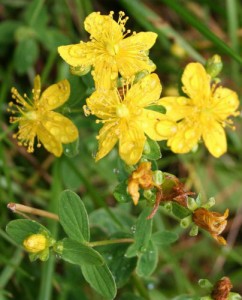St.john’s wort is an herb mostly found in Europe and US. It grows naturally, but due to its variety of health benefits, people are planting it in their homes, not mainly for aesthetic value, but for medical purposes.
Uses of St. John’s Wort
For centuries, St. John’s wort her has been used to treat various disorders especially depression and anxiety. A study conducted in 2005 to establish its effectiveness found that it significantly reduced anxiety and depression. People suffering from anxiety and depression were found to have unusual levels of neurotransmitters in the brain. With the help of St.Johns wort, symptoms of physical anxiety and depression such as fatigue, profuse sweating, restlessness and headache were significantly reduced. Some research has found this St. John’s wort as effective as some prescription antidepressants.
St. John’s wort is wholly a natural product that works naturally to treat depression and anxiety. Its flowers and leaves contain photodynamic molecules which are to trap sunlight. It also contains hypericin, naphthodianthrones, hyperiforin, xanthenes and flavanols. These are the same ingredients used in medicines used to treat people who are plagued with depression and anxiety disorders.
Naphthodianthrones and hyperiforin compounds in the wort have the ability to modulate brain signals and significantly boost the functionality of the nervous system. Hypericin found in this product has been found effective in regulating the amount of acetylcholine, which has a direct effect on your memory and muscular movements.
There ongoing research show that St. John’s wort is as effective as Prozac or Zoloft in treating mild to moderate anxiety or depression.
Dosage ranges from 600 milligrams to 800 milligrams. You should also vary the dosage according to the body response to medication.
However, dosage also varies because the concentration of ingredients also vary according to the environment the herb has grown. Before using this product, it is very important to discuss with the dealer, and also notify your doctor.
Risks of taking St. John’s wort
When the dosage is properly followed, St.John’s wort has no side effects. However, just like any other medications, it has some simple side effects which your body can adopt as you continue with its use. Some of its side effects include.
- Allergic reactions
- Fatigue and restlessness with long term use
- Increased blood pressure
- Anxiety
- Dry mouth.
- Sensitivity to sunlight.
- Dizziness.
- Stomach upset.
- Headache.
Sexual problems and fatigue.
By following the correct dosage, you can avoid most of the side effects.
Drug interaction
- Tricyclic antidepressants
- HIV drugs, such as Indinavir
- Birth control pills
- SSRIs, (Selective serotonin reuptake inhibitors)
- Cyclosporine.
- Digoxin
- Warfarin and other anticoagulants.
Who should not use this product?
St.johns wort should not be used by children, pregnant or breastfeeding mothers.
Why should I use St. John’s wort?
There has been enough research and evidence supporting its use. It wholly a natural product that when properly used, it has no side effects.
Read More






Leave a Reply